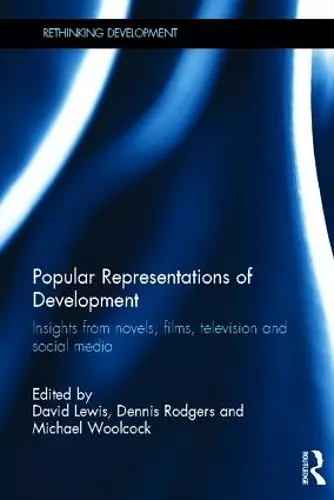Popular Representations of Development
Insights from Novels, Films, Television and Social Media
David Lewis editor Michael Woolcock editor Dennis Rodgers editor
Format:Hardback
Publisher:Taylor & Francis Ltd
Published:21st Aug '13
Currently unavailable, and unfortunately no date known when it will be back
This hardback is available in another edition too:
- Paperback£49.99(9780415822817)

Although the academic study of development is well established, as is also its policy implementation, less considered are the broader, more popular understandings of development that often shape agendas and priorities, particularly in representative democracies.
Through its accessible and provocative chapters, Popular Representations of Development introduces the idea that while the issue of ‘development’ – defined broadly as problems of poverty and social deprivation, and the various agencies and processes seeking to address these – is normally one that is discussed by social scientists and policy makers, it also has a wider ‘popular’ dimension. Development is something that can be understood through studying literature, films, and other non-conventional forms of representation. It is also a public issue, one that has historically been associated with musical movements such as Live Aid and increasingly features in newer media such as blogs and social networking. The book connects the effort to build a more holistic understanding of development issues with an exploration of the diverse public sphere in which popular engagement with development takes place.
This book gives students of development studies, media studies and geography as well as students in the humanities engaging with global development issues a variety of perspectives from different disciplines to open up this new field for discussion.
Popular representations of development and poverty have always been all around us, and scholars need to understand these alternative conceptualizations of reality to enrich their own discipline-based analysis and policy recommendations. This excellent volume suggests some ways in which this can happen, setting out the gains and the pitfalls of engagement. It is a thought provoking contribution to an important issue in development studies.
–Ravi Kanbur, Cornell University, USA.
This book is for a worthy cause, that of going beyond the currently popular quantitative and experimental approach to economic development, to look into wider, often more insightful, humanistic forms of representation of the development process. It shows how representations in literature, films, television, and internet may capture the complexity and nuances of the social processes involved in development in ways not considered in the standard approach.
–Pranab Bardhan, University of California, Berkeley, USA.
This wonderfully engaging and thought-provoking collection provides many lessons about representation and power for researchers and students alike. It will prove to be an invaluable teaching resource and will become a benchmark for much future research.
–Cathy McIlwaine, University of London, UK.
An important milestone in development studies which shows how literature, film and other discourses need to be part of the mix when we try to understand how other people live.
–Giles Foden, author of The Last King of Scotland and Turbulence.
An essential analysis of the world of international development… and essential reading for rock stars everywhere.
–Richard Bean, author of The God Botherers and One Man, Two Guvnors.
…this book provides a timely and significant parameter in the study of development through the exploration of its popular representations in representative Western democracies. Through the illustration and analysis of diverse case studies with respect to the power of the image in shaping and sharing meaning about the concept of development, it illuminates the prevalence of popular culture and calls for a more grounded understanding of public perceptions of progress. It is certain to be a great read for scholars of development studies, media and communications, sociology, anthropology and geography at all levels.
–Eleftheria Lekakis, Lecturer in Media and Communications, University of Sussex
ISBN: 9780415822800
Dimensions: unknown
Weight: 680g
280 pages